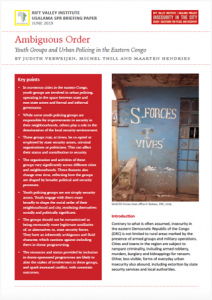Key points
- In numerous cities in the eastern Congo, youth groups are involved in urban policing, operating in the space between state and non-state actors and formal and informal governance.
- While some youth policing groups are responsible for improvements in security in their neighbourhoods, others play a role in the deterioration of the local security environment.
- These groups may, at times, be co-opted or employed by state security actors, criminal organizations or politicians. This can affect their status and contribution to security.
- The organization and activities of these groups vary significantly across different cities and neighbourhoods. These features also change over time, reflecting how the groups are shaped by broader political and security processes.
- Youth policing groups are not simply security actors. Youth engage with them more broadly to shape the social order of their neighbourhood and city, rendering themselves socially and politically significant.
- The groups should not be romanticized as being necessarily more legitimate auxiliaries of, or alternatives to, state security forces. They have an inherently ambiguous and fluid character, which cautions against including them in donor programming.
- The resources and status provided by inclusion in donor-sponsored programmes are likely to alter the stakes of involvement in these groups, and spark increased conflict, with uncertain outcomes.




